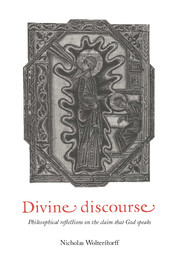Book contents
- Frontmatter
- Contents
- Preface
- 1 Locating our topic
- 2 Speaking is not revealing
- 3 The many modes of discourse
- 4 Divine discourse in the hands of theologians
- 5 What it is to speak
- 6 Could God have and acquire the rights and duties of a speaker?
- 7 Can God cause the events generative of discourse?
- 8 In defense of authorial-discourse interpretation: contra Ricoeur
- 9 In defense of authorial-discourse interpretation: contra Derrida
- 10 Performance interpretation
- 11 Interpreting the mediating human discourse: the first hermeneutic
- 12 Interpreting for the mediated divine discourse: the second hermeneutic
- 13 Has Scripture become a wax nose?
- 14 The illocutionary stance of biblical narrative
- 15 Are we entitled?
- 16 Historical and theological afterword
- Notes
- Index
8 - In defense of authorial-discourse interpretation: contra Ricoeur
Published online by Cambridge University Press: 01 June 2011
- Frontmatter
- Contents
- Preface
- 1 Locating our topic
- 2 Speaking is not revealing
- 3 The many modes of discourse
- 4 Divine discourse in the hands of theologians
- 5 What it is to speak
- 6 Could God have and acquire the rights and duties of a speaker?
- 7 Can God cause the events generative of discourse?
- 8 In defense of authorial-discourse interpretation: contra Ricoeur
- 9 In defense of authorial-discourse interpretation: contra Derrida
- 10 Performance interpretation
- 11 Interpreting the mediating human discourse: the first hermeneutic
- 12 Interpreting for the mediated divine discourse: the second hermeneutic
- 13 Has Scripture become a wax nose?
- 14 The illocutionary stance of biblical narrative
- 15 Are we entitled?
- 16 Historical and theological afterword
- Notes
- Index
Summary
We have been exploring the possibility that God speaks. It is time now to turn to issues of interpretation. When confronted with a purported case of divine discourse, how does one set about interpreting the phenomenon so as to find out what God said? Of course, Antony and Augustine didn't do anything that could be described as “setting about” interpreting. Though they interpreted, they didn't set about doing that. They just found themselves believing that God was then and there saying so-and-so to them – rather as we, when engaged in conversation, typically interpret what our conversational partners say without setting about doing so. We must not lose such cases from view; they occupy an important place in the whole picture of divine discourse. But in my discussion of interpretation, I propose focusing on cases in which we do set about interpreting.
I also propose focusing on the interpretation of texts. I have repeatedly called attention to the fact that the Judaic, the Christian, and the Islamic traditions all claim that the media of divine speech comprise much more than texts – indeed, much more than words, whether those be in the form of texts or not. God speaks by way of burning bushes, mystical experiences, national calamities – and centrally, so Christians claim, by the very presence among us of a certain person, Jesus of Nazareth.
- Type
- Chapter
- Information
- Divine DiscoursePhilosophical Reflections on the Claim that God Speaks, pp. 130 - 152Publisher: Cambridge University PressPrint publication year: 1995



